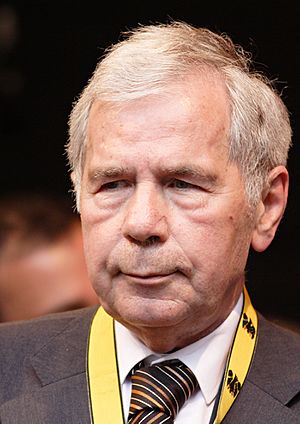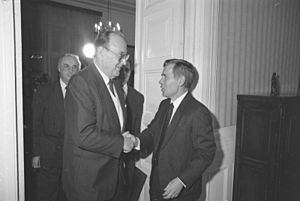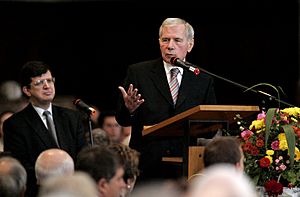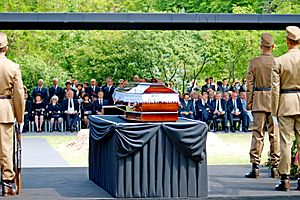Gyula Horn facts for kids
Quick facts for kids
Gyula Horn
|
|
|---|---|

Horn in 2007
|
|
| Prime Minister of Hungary | |
| In office 15 July 1994 – 6 July 1998 |
|
| President | Árpád Göncz |
| Preceded by | Péter Boross |
| Succeeded by | Viktor Orbán |
| Member of the National Assembly | |
| In office 2 May 1990 – 13 May 2010 |
|
| Minister of Foreign Affairs | |
| In office 10 May 1989 – 23 May 1990 |
|
| Prime Minister | Miklós Németh |
| Preceded by | Péter Várkonyi |
| Succeeded by | Géza Jeszenszky |
| Personal details | |
| Born | 5 July 1932 Budapest, Hungary |
| Died | 19 June 2013 (aged 80) Budapest, Hungary |
| Political party | MSZP (1989–2013) |
| Other political affiliations |
MDP (1954–1956) MSZMP (1956–1989) |
| Spouse | Anna Király |
| Children | 2 |
| Signature |  |
Gyula János Horn (born July 5, 1932 – died June 19, 2013) was an important Hungarian politician. He served as the Prime Minister of Hungary from 1994 to 1998.
People remember Horn for two main reasons. First, he was the last Communist Foreign Minister of Hungary. In 1989, he played a big part in opening the "Iron Curtain" for East Germans. This helped lead to Germany becoming one country again. Second, during his time as Prime Minister, he introduced a major economic plan called the "Bokros package." This plan made tough changes to help Hungary's economy after the communist era.
Contents
Early Life and Education
Gyula Horn was born in Budapest, Hungary, in 1932. He was the third of seven brothers. His father worked in transport, and his mother worked in a factory. They lived in a poor area.
During World War II, in 1944, German soldiers took his father away. He never came back home. Gyula Horn's niece, Szófia Havas, later became a Member of Parliament.
Gyula Horn first went to a technical school in Hungary. He then studied economics and finance in Russia, graduating in 1954. Later, he continued his political studies in Hungary. He earned a degree in economic sciences in 1977.
In 1956, he married Anna Király, a statistician. They had two children, Anna and Gyula Jr.
Political Career
Starting in Communist Hungary
In 1954, Gyula Horn joined Hungary's communist party. It was called the Hungarian Working People's Party (MDP) at the time. In 1956, he helped change the party into the Hungarian Socialist Workers' Party (MSZMP). This party was led by János Kádár.
From 1954 to 1959, Horn worked in the Ministry of Finance. In 1959, he started working in the Foreign Ministry. He served as a diplomat in Hungarian embassies in Bulgaria and Yugoslavia during the 1960s.

By 1985, he became a deputy minister in the Foreign Ministry. In 1989, he became the Foreign Minister in Hungary's last communist government. At this time, Horn was part of a group in the party that wanted reforms. They wanted Hungary to become a Western-style democracy with a market economy.
Opening the Iron Curtain
As Foreign Minister, Horn made a very important decision. Hungary decided to open its western border, known as the "Iron Curtain." This allowed thousands of East Germans, who were visiting Hungary, to cross into Austria and then go to West Germany.
On June 27, 1989, Horn and his Austrian counterpart, Alois Mock, cut a barbed wire fence at the border. This was a symbolic act. Horn then ordered the border to be fully opened. This act greatly helped the later unification of Germany. Many East Germans quickly moved to the West. Horn told East German officials that international rules about refugees were more important than old agreements. This event helped start the fall of communist governments in the region. Soon after, the Soviet Union itself broke apart.
Later in 1989, Horn helped change the MSZMP into the Hungarian Socialist Party. As Foreign Minister, he also helped arrange the agreement for Soviet troops to leave Hungary in March 1990. He was one of the first Hungarian politicians to suggest that Hungary should join NATO and the European Union.
After Communism
Gyula Horn was elected to the Hungarian Parliament in 1990. He remained a Member of Parliament until 2010. From 1990 to 1993, he led the Parliamentary Committee on Foreign Affairs. In 1990, he also became the leader of the Socialist Party.
In the 1994 election, Horn led the Socialists to a big victory. They won many seats in Parliament. Even though they had enough seats to govern alone, Horn decided to form a coalition government. He teamed up with the liberal Alliance of Free Democrats. This gave his government a strong majority. A few days before the election, Horn was in a car accident and had to wear a special neck brace for months.
In 1995, Horn's government introduced the "Bokros package." This was a major program to make tough economic changes. It was a difficult decision for his party, but Horn worked hard to get them to agree.
After the Socialists lost the 1998 election, Horn stepped down as party leader. However, he remained influential in the party for a long time. He was very popular among older voters. After 2002, he mostly retired from active politics.
Horn received several awards for his work in foreign relations. One notable award was the Charlemagne Prize in 1990. However, he did not receive a high Hungarian state award in 2007. The Hungarian President refused it because of Horn's past views on the 1956 revolution.
His Role in 1956
One of the most debated parts of Gyula Horn's life is his role after the 1956 Hungarian Revolution. This revolution began on October 23 and was put down by Soviet troops in early November.
In late October 1956, Horn joined the National Guard. This group included soldiers, police, and freedom fighters. In December, he joined the "pufajkás" brigades. These were communist paramilitary groups that helped the Soviet troops restore communist rule. He served in this group until June 1957. Some people criticize his role because these groups were accused of harsh actions during and after the uprising.
Horn said that his older brother was killed by revolutionaries during the uprising. However, his brother's death certificate states he died in a traffic accident. Horn said he joined the "pufajkás" squad to defend law and order. He believed that the uprising had released criminals who made public safety worse. He also stated that 1956 was not a fight against communism itself.
Horn's exact actions in crushing the revolution are not fully clear. However, in 1957, he received an award given to those whose services were highly valued. When he became Prime Minister and was asked about this part of his life, he simply said, "I was a pufajkás. So what?"
Illness and Death
In August 2007, Gyula Horn became very ill. He was treated in a hospital in Budapest. Reports suggested he had a serious brain condition. His health worsened, and he could not leave the hospital. By 2008, he was no longer able to recognize his family or friends due to an illness similar to Alzheimer's disease.
On July 5, 2012, Horn turned 80 years old. Prime Minister Viktor Orbán sent him a letter. Orbán wrote that despite their political differences, they were both Hungarians working for the nation's well-being. The Hungarian Socialist Party also celebrated his birthday.
After struggling with his illness for several years, Gyula Horn died on June 19, 2013. He was survived by his wife, Anna, and his children, Anna and Gyula Jr.
Many people shared their thoughts after his death. Germany's Foreign Minister, Guido Westerwelle, said Horn's "courageous work" as Hungarian Foreign Minister would be "unforgettable." Reuters called him the "man who tore the iron curtain."
Attila Mesterházy, the leader of the Hungarian Socialist Party, said Horn was one of the most important leaders of the modern Hungarian left. He called him one of Hungary's most successful prime ministers. Former Prime Minister Ferenc Gyurcsány called Horn the "most contradictory" and "most talented" politician. He added that "a great man has passed away."
The government party Fidesz sent condolences to Horn's family. András Schiffer, a co-chair of another party, said Horn was one of the most important people in Hungary after communism. He acknowledged Horn's humanity towards ordinary people. Gordon Bajnai, another political leader, said Hungary and Europe lost a "true statesman." He added that Horn was a "symbol of a peaceful and successful regime change." President János Áder also sent his condolences.
Funeral
Gyula Horn received a state funeral with military honors on July 8, 2013. He was buried at the Kerepesi Cemetery in Budapest. Thousands of people attended the funeral. Many laid red flowers by his grave. Important figures like the President of the European Parliament Martin Schulz and former German Foreign Minister Hans-Dietrich Genscher were there. Hungarian President János Áder and former heads of state also attended.
Prime Minister Viktor Orbán and several former prime ministers paid their respects. When Orbán bowed his head, some people in the crowd booed. A Socialist lawmaker later said this was disrespectful to the event.
Béla Katona, a former Speaker of the National Assembly, said that Gyula Horn's life covered the history of the 20th century. He said Horn shaped the future of both Hungary and Europe. Katona added that Horn was a successful man and a true statesman, even though he was not perfect and made some bad decisions.
Selected Publications
- Baranyi, Mária: Egy előszoba titkai – Horn Gyula közelről 1994–1998. Athenaeum Könyvkiadó, Budapest, 2010.
- Horn, Gyula: Cölöpök. Zenit Könyvek, Budapest, 1991.
- Horn, Gyula: Azok a kilencvenes évek.... Kossuth Kiadó, Budapest, 1999.
- Kubinyi, Ferenc: Vaskorona. Edition Litfas, 1995.
- Pünkösti, Árpád: A Horn. Angyalföldtől a pártelnökségig 1932–1990. Kossuth Kiadó, Budapest, 2013.
- Szerdahelyi, Szabolcs: Hiányzó cölöpök – Ami a Horn Gyula életrajzból kimaradt. Kairosz Kiadó, Budapest, 2002.
| Political offices | ||
|---|---|---|
| Preceded by Péter Várkonyi |
Minister of Foreign Affairs 1989–1990 |
Succeeded by Géza Jeszenszky |
| Preceded by Péter Boross |
Prime Minister of Hungary 1994–1998 |
Succeeded by Viktor Orbán |
| Party political offices
|
||
| Preceded by Rezső Nyers |
Chairman of the Hungarian Socialist Party 1990–1998 |
Succeeded by László Kovács |
See also
 In Spanish: Gyula Horn para niños
In Spanish: Gyula Horn para niños
 | Tommie Smith |
 | Simone Manuel |
 | Shani Davis |
 | Simone Biles |
 | Alice Coachman |



